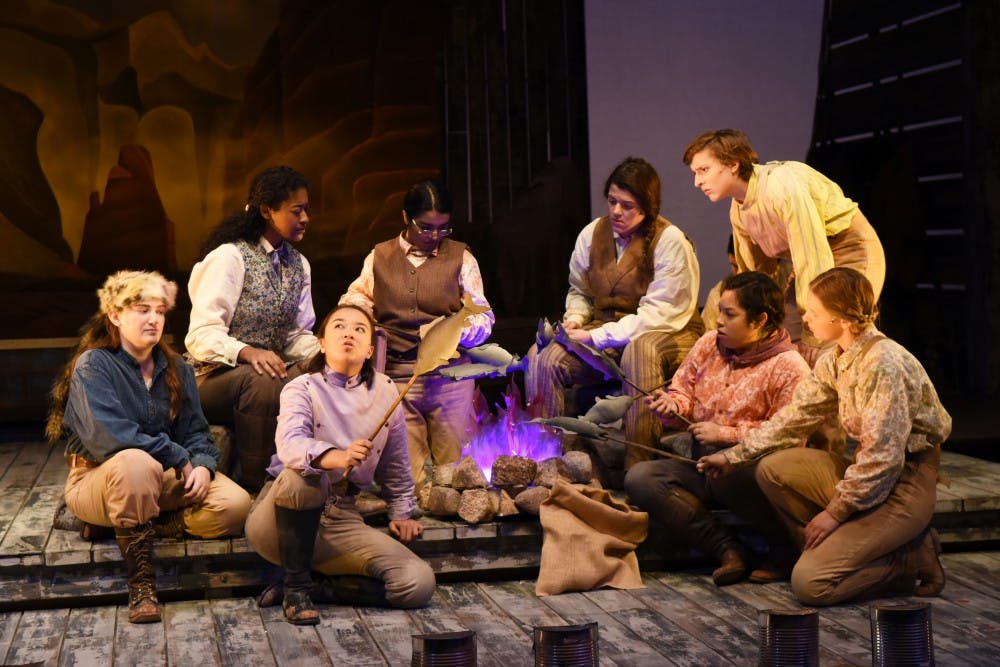In this day and age of theater, representation is a hot topic.
Take plays such as Hamilton, which casts all non-white actors to play historical white men and women. Recently in the theater community, there's also been a push towards color-blind casting.
Because not many plays offer roles to minorities, casting minorities in roles that are typically white (like "Hamilton") sends the message to audiences and the theater community that minorities can play multi-dimensional, leading roles.
Minorities don't just have to play stereotypical, minor roles. And it's a shame that in our society, we often assume that the only dimensional characters are the ones who are typically white males. Why are minority characters often one-dimensional and flat?
ASU's theater program prides itself on being innovative and experimental when it comes to the shows they produce. It's an aspect of the theater program here that I love.
Just take a look at ASU School of Film, Dance and Theater's recent MainStage production of "Men on Boats" directed by Tracy Liz Miller.
"'Men on Boats' retells John Wesley Powell's 1869 expedition down the Colorado River into the Grand Canyon. Written by Jaclyn Backhaus, the show is about a group of ten white men, but performed by a cast of non-male actors of varying ethnic backgrounds," Molly Bishop, an ASU freshman theater major who plays Seneca Howland and The Bishop, said.
Seeing a play about manifest destiny with all female actors of varying ethnicities made me enjoy the play even more. In my opinion, our education system does a terrible job at covering the stories of minorities here in the U.S.
Europeans — mostly European males — are usually the protagonists in narratives about history that we are taught. Minorities are just side stories and serve only as the groups with which the white men interact in history lectures.
Textbooks often leave out the fact that manifest destiny gave white settlers the right to kill Native Americans "if necessary" as they expanded west.
You can forget about women and non-males for that matter — manifest destiny had far-reaching effects on females as well, particularly women of minority races.
The history of minorities here in the U.S. must be taught better. Even if that's not explicitly said in "Men on Boats" that is a message that I, as an audience member, picked up by watching the show.
Often times, when minorities are cast as white people in any form of media, there is almost always an outcry from narrow-minded white people who feel their roles have been stolen.
It's almost as if that's what minority actors feel like when people of color are played by white actors. For centuries, white men have played minorities in theater. However, when this is flipped, minority actors are given an opportunity that they otherwise are usually not offered.
"If we keep casting white men for these parts we're going to keep forgetting the idea that humans are equal no matter what gender or ethnicity they identify with," Bri Ralston, a freshman theater major at ASU who plays Andrew Hall, said.
"If some people prefer more historically accurate casting because they feel left out of the applicant pool to be a performer in the show, they've effectively stepped into the shoes of a non-white, non-male actor," Bishop said. "It's uncomfortable, it's disappointing and hopefully, in a lot of ways, it's eye opening."
I couldn't agree more with both of them. In movies, white people are cast as minorities all the time.
Minorities always voice their concern when this happens but the industry keeps doing it. So if there are people who are upset by the casting for "Men on Boats," all I have to say is: how about them apples?
This is how minorities feel all the time. And hopefully shows like "Men on Boats" persuade aspiring playwrights to write plays that have more characters who are non-male and non-white.
"I want people to see that women can do whatever they want. They don't have to play the damsel in distress or the mother in the kitchen," Ralston adds.
"Men on Boats" plays for it's final weekend March 30-April 2. Tickets available here. (CQ)
Reach the columnist at miharri1@asu.edu or follow @IdalisHarris on Twitter.
Editor’s note: The opinions presented in this column are the author’s and do not imply any endorsement from The State Press or its editors.
Want to join the conversation? Send an email to opiniondesk.statepress@gmail.com. Keep letters under 500 words and be sure to include your university affiliation. Anonymity will not be granted.
Like The State Press on Facebook and follow @statepress on Twitter




